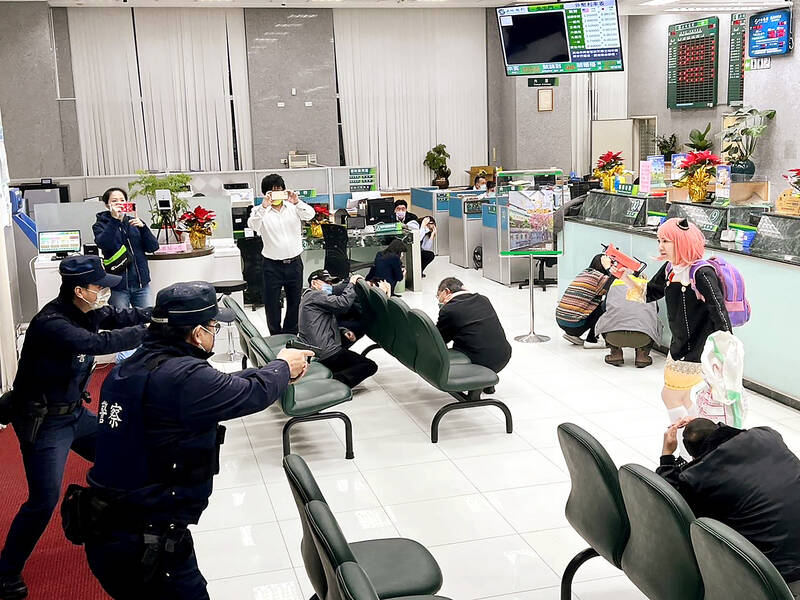The National Police Agency has finished installing its first virtual reality (VR) police training systems at seven police departments and institutions across Taiwan to prepare police officers for tense situations in the line of duty.
The VR systems were installed at the New Taipei City, Taoyuan, Kaohsiung and Chiayi County police departments, as well as the Railway Police Bureau, the Taiwan Police College and the First Police Special Corps 6th Corps at the end of last year, costing NT$45 million (US$1.48 million), the agency said.
Although some local police forces had acquired augmented reality (AR) immersive police training systems under a special project launched in 2020, the VR training systems are the first of their kind in Taiwan and offer new training features, the agency said.

Photo: CNA
They require users to wear headsets, while the AR systems, which use projection screens, do not, enabling the simulation of different settings, including karaoke bars, concourses, train carriages and checkpoints.
Through such simulations, officers are trained to be more aware of their surroundings, while having the opportunity to practice their skills and become more familiar with situations that require them to use weapons, which would improve their performance in a crisis, it said.
Trained officers can be prepared for a wide range of scenarios, such as when faced with provocations, threats, attempts to flee or attacks by a suspect, in which they have to respond quickly and appropriately, it said.
The system also enables officers to simulate talking with suspects, choosing from different types of police weapons and deciding when to fire a gun, and it even has a “multiplayer” mode in which multiple officers can train at the same time to provide “backup” for their colleagues.
The renewed emphasis on training for police officers to handle unexpected situations or crises comes after the death of railway police officer Lee Cheng-han (李承翰).
Lee was stabbed in 2019 at the Taiwan Railways Administration Chiayi Station by a passenger riding without a ticket who had an altercation with the conductor before Lee was called to the scene.
Former National Police Agency director-general Chen Ja-chin (陳家欽) said in 2020 that in the wake of Lee’s death, the agency was given a budget of NT$480 million to procure and install situational simulation shooting ranges around Taiwan to train police officers to make quick and sound judgements while on duty.
The agency said it intends to purchase more VR training systems to install at other police departments and institutions, and to ask instructors to create virtual settings based on past missions that would make the training more realistic and broaden its scope.

UNILATERAL MOVES: Officials have raised concerns that Beijing could try to exert economic control over Kinmen in a key development plan next year The Civil Aviation Administration (CAA) yesterday said that China has so far failed to provide any information about a new airport expected to open next year that is less than 10km from a Taiwanese airport, raising flight safety concerns. Xiamen Xiangan International Airport is only about 3km at its closest point from the islands in Kinmen County — the scene of on-off fighting during the Cold War — and construction work can be seen and heard clearly from the Taiwan side. In a written statement sent to Reuters, the CAA said that airports close to each other need detailed advanced

Tropical Storm Fung-Wong would likely strengthen into a typhoon later today as it continues moving westward across the Pacific before heading in Taiwan’s direction next week, the Central Weather Administration (CWA) said. As of 8am, Fung-Wong was about 2,190km east-southeast of Cape Oluanpi (鵝鑾鼻), Taiwan’s southernmost point, moving westward at 25kph and possibly accelerating to 31kph, CWA data showed. The tropical storm is currently over waters east of the Philippines and still far from Taiwan, CWA forecaster Tseng Chao-cheng (曾昭誠) said, adding that it could likely strengthen into a typhoon later in the day. It is forecast to reach the South China Sea

WEATHER Typhoon forming: CWA A tropical depression is expected to form into a typhoon as early as today, the Central Weather Administration (CWA) said yesterday, adding that the storm’s path remains uncertain. Before the weekend, it would move toward the Philippines, the agency said. Some time around Monday next week, it might reach a turning point, either veering north toward waters east of Taiwan or continuing westward across the Philippines, the CWA said. Meanwhile, the eye of Typhoon Kalmaegi was 1,310km south-southeast of Oluanpi (鵝鑾鼻), Taiwan’s southernmost point, as of 2am yesterday, it said. The storm is forecast to move through central

Almost a quarter of volunteer soldiers who signed up from 2021 to last year have sought early discharge, the Legislative Yuan’s Budget Center said in a report. The report said that 12,884 of 52,674 people who volunteered in the period had sought an early exit from the military, returning NT$895.96 million (US$28.86 million) to the government. In 2021, there was a 105.34 percent rise in the volunteer recruitment rate, but the number has steadily declined since then, missing recruitment targets, the Chinese-language United Daily News said, citing the report. In 2021, only 521 volunteers dropped out of the military, the report said, citing